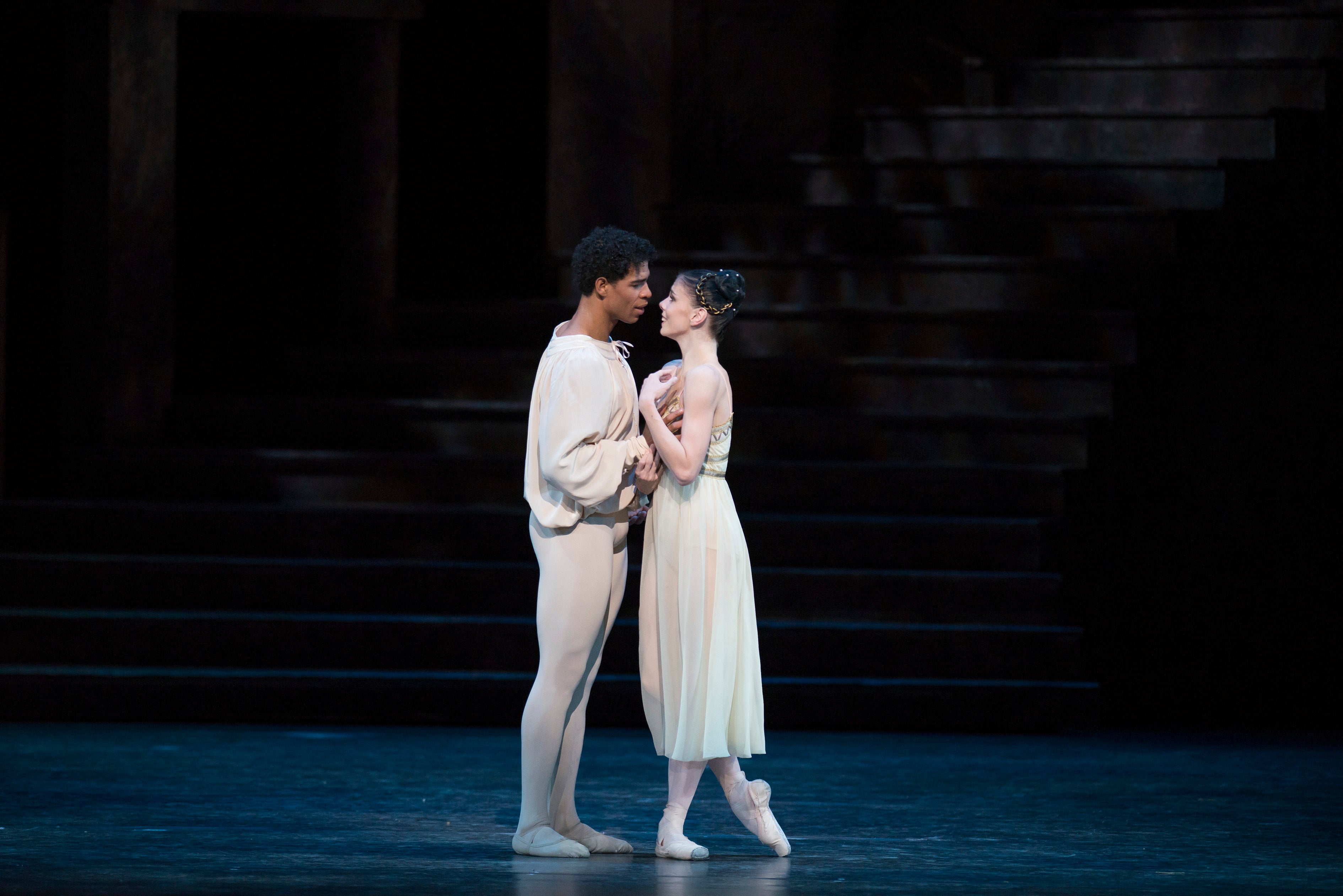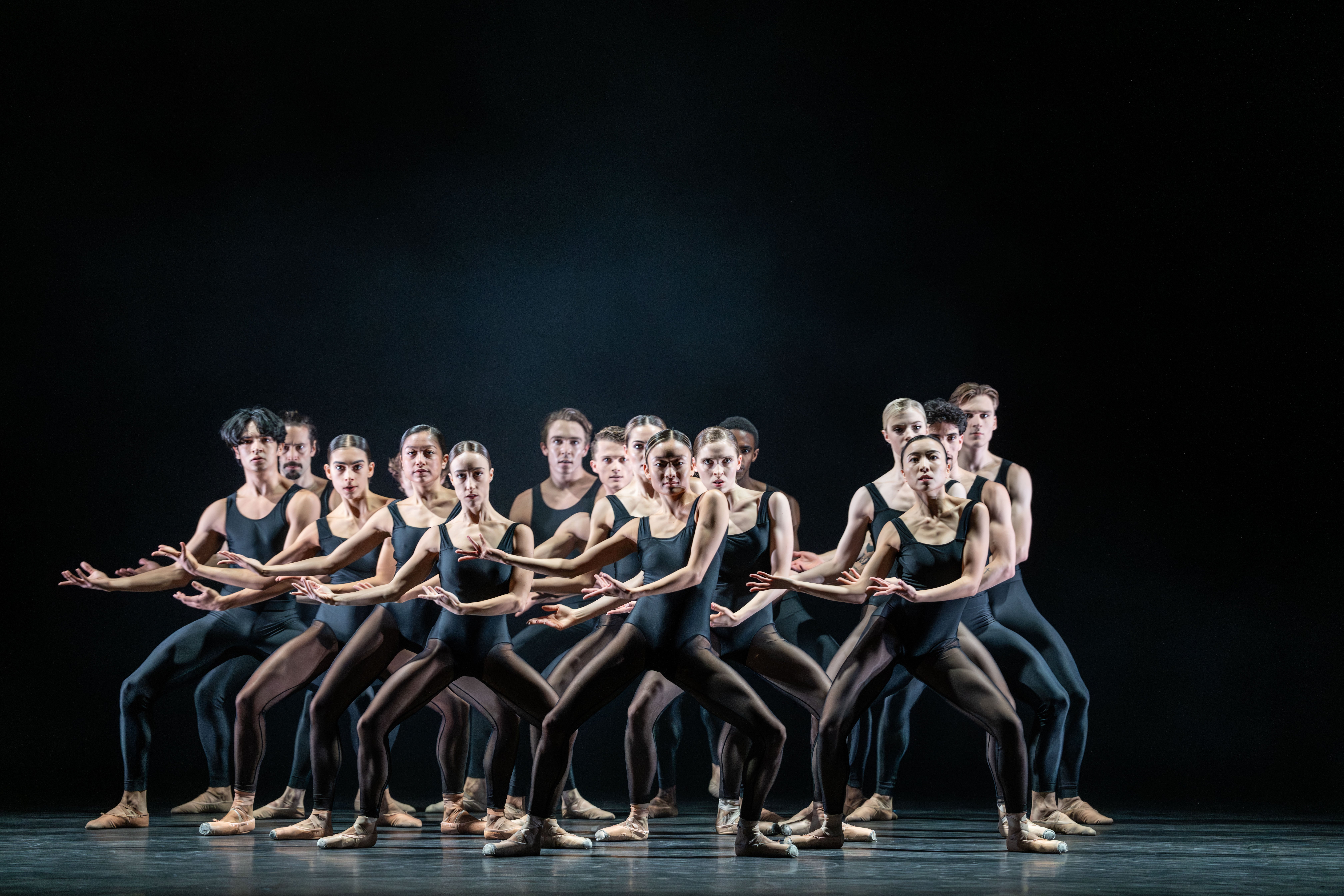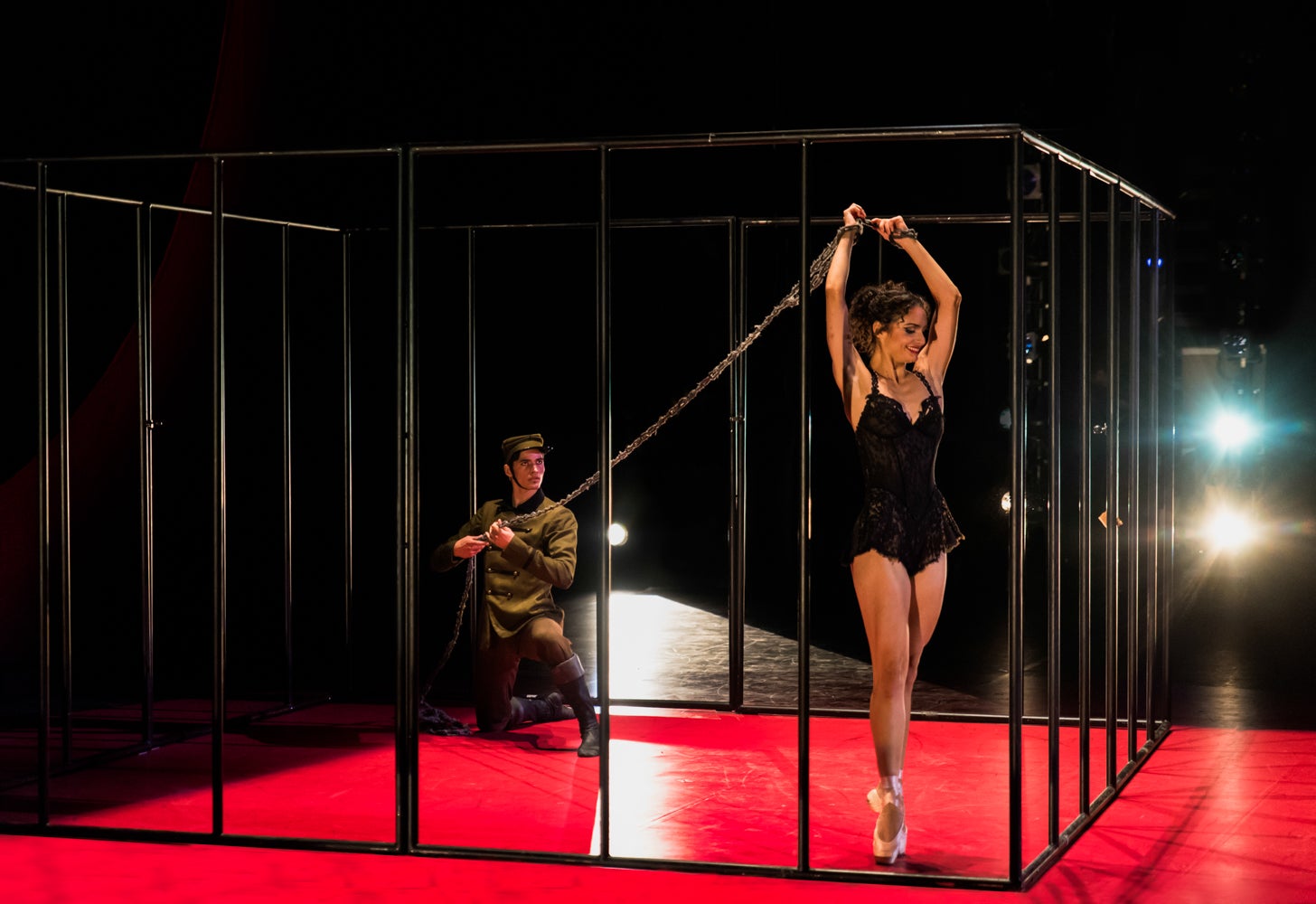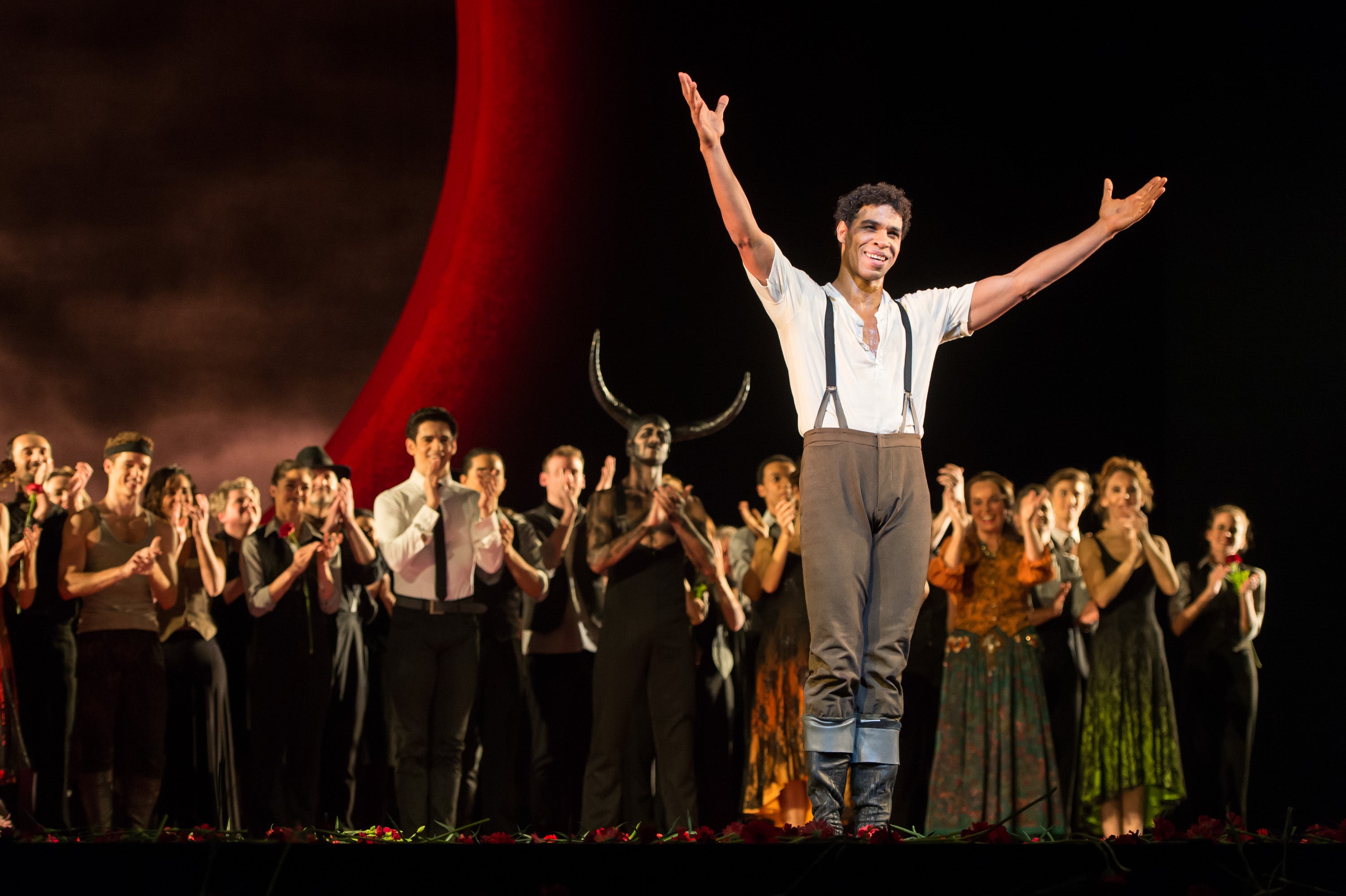We’re on a wild goose chase looking for Carlos Acosta. The Cuban-born ballet star, who has just turned 51, is not at the stage door of London’s Sadler’s Wells, where his Cuban dance company Acosta Danza will perform his full-length production of Carmen in July. He’s not in the company office, or in the main auditorium where the Birmingham Royal Ballet, of which he’s been director since 2020, is rehearsing The Sleeping Beauty. Calls are being made. The receptionist swears she saw him leave the building. His name is signed in the visitors’ book. Houdini?
When he finally appears, it’s the grand entrance we’ve all been waiting for. He’s wearing black shiny boots, a 1970s-style Starsky & Hutch tan leather jacket, and jeans. His feet are positioned outwards like he’s been moulded forever in ballet’s first position.
“I’m so tired,” he says warmly in his thick Cuban accent, looking like he really needs to go straight to bed. “I came from Florida this morning. I was dancing in this production of mine called On Before,” he continues, referring to his most personal work yet – a homage to his late mother. “It is probably the only show that I can still do from beginning to end at my age.”
Acosta, who was born in a Havana slum in 1973, retired from classical ballet in 2015. Yet such has been his influence on the ballet world that he continues to cast a spell on the industry nearly a decade on. His career is jam-packed with startling highs: in 1991, he became the English National Ballet’s youngest ever principal dancer when he joined the company at the age of 18, bringing with him both machismo and a palpable Cuban warmth to the then pale, repressed and European ballet scene.
Such was his gravity-defying athleticism, his performances would inspire gasps of disbelief from the audience. He became the Royal Ballet’s first Black principal dancer in 2003, and the first to play Romeo in 2006. “Romeo, with my big afro hair. That was new on the stages of Covent Garden and Paris Opera,” he chuckles.
What’s more, his ability to convey primal, raw emotion allowed him to connect with the public in a way very few ballet dancers manage: when he danced Romeo and Juliet in 2011 at the O2 Arena with Tamara Rojo and the cast of the Royal Ballet, it was to an audience of 13,500 people. During his last ever performance with the Royal Ballet, in Carmen in 2015, Acosta received a 20-minute standing ovation at London’s Royal Opera House.
He’s as adept a choreographer as he was once a dancer: his staging of Don Quixote – his first work for the Royal Ballet in 2013 – is an enduring classic. Now Acosta is on a quest to bring ballet to new audiences “for the survival of the art form itself”. His 2023 heavy metal ballet Black Sabbath, with the Birmingham Royal Ballet, was a sell-out show at Sadler’s Wells and “a headbanging triumph”, according to one critic, for both ballet and rock audiences. He’s the Nigel Kennedy of the dance world in the way he invigorates the classics. His much-anticipated Nutcracker in Havana, a Cuban take on the ballet classic, will tour the UK in November.

Yet he doesn’t believe the ballet repertoire itself needs a serious overhaul. “I don’t think ballet has an image problem,” Acosta tells me. He points out, instead, that “attracting new audiences for ballet takes collaboration”. “It’s a balance, and part of my vision [at Birmingham] is to continue to perform classical and heritage ballets and also commission new work from emerging artists across all disciplines.”
He points to the success of this approach already at BRB, where, he argues, the audience perception of the company “has changed significantly – for the better” in the four years since he took over. “We had a phenomenal number of first-time ballet attenders for Black Sabbath – The Ballet… but also our spring 2024 tour of The Sleeping Beauty is the most successful of this classic production in the Birmingham Royal Ballet company’s history.”
The ballet world has changed dramatically since Acosta exploded onto the European scene in the 1990s. For one thing, more dancers of colour are pushing up through ballet’s ranks. Misty Copeland, the first Black woman to become principal dancer with the American Ballet Theatre, has talked about being asked to lighten her skin; she has also described being excluded from the corps of swans in Swan Lake early in her career because she would have ruined the aesthetic by being the only brown person.
But Acosta argues much has improved since then. “That’s not the way it is now. Now it’s easier because people are more receptive … We live in a world where ballet companies are looking to diversify, so they have the right representation of the world we live in today.”
Acosta himself experienced racism more in his own family, he says, than in the world of ballet. His mother Dulce was white, and his father Pedros was Black. “Some of my family members on my mother’s side would much rather take my wife’s sister to Varadero beach [in Cuba] instead of us, [because we weren’t white].”

It was Acosta’s father – a lorry driver – who wanted Acosta to have a better life, sending him to the National Ballet of Cuba aged nine. Acosta hated it. He felt very lonely, catching two or three buses there and back on his own. “The buses were full. I was hanging on the door to go to school, while other parents held their child’s hands.”
In his bestselling memoir No Way Home (2008) – the basis of the 2018 film Yuli about his life – he admits he only went to ballet school to get a square meal. He longed to play football, not to do repetitive ballet exercises. At 13, he was expelled and sent to a boarding school for the performing arts in Pinar del Río province. By the age of 16, he was being called the “Cuban Billy Elliot” when he won the Prix de Lausanne in 1990.
“But I’m the opposite of Billy Elliot,” he says, while stretching his legs as if they are stiff. “Billy Elliot wanted to dance. I didn’t. My father was the one who wanted me to dance.”
Acosta, therefore, won’t be imposing a life of ballet on the three daughters he has with his wife Charlotte (Aila,12, and twins Luna and Maya, seven; the family spend most of the time in their house in Frome). “It’s rewarding, but I wouldn’t recommend it to anyone,” he says.

I bring up the allegations, recently published by the BBC, of a toxic culture at two of the UK’s top ballet schools, the Royal Ballet School and Elmhurst Ballet School, in which former students accused both institutions of bullying and body shaming. Both schools denied the allegations but also said they were working hard to change the culture and prioritise health and wellbeing. Has he witnessed fat-shaming among female dancers during his career?
Acosta looks uneasy at the “weight” question. “No, we can’t talk about weight… sorry.” I press the question. After all, he’s spoken openly in interviews about meal times at ballet school in Cuba, where he’d be constantly hungry, keeping “one eye” on the ballerinas “who wanted to be thinner, because they didn’t always finish their meals”.
“[Weight] is a very hard word, because right now, you know if you say ‘shape’…” he begins. “But as a professional, you have to watch [your weight]. You have to ‘watch your line’” – by which he means the harmonious aesthetic of a dancer’s body in motion. “Women have always been carried [in ballet],” he continues. “Obviously, sometimes, the guy [doing the lifting] can’t cope … if the girl isn’t light enough. No one wants anyone to become ill – please, no one wants that – but dancers have to keep within a range so the partner can cope with the steps.”
These days, Acosta himself dances only rarely on stage, although he will dance the Bull in his new production of Carmen. The Bull is “a striking presence”, he says, but it’s “not that much of a dancing role at this stage of my career. It’s very manageable.” He’s only too aware of his own limitations. “Ballet is entirely exposed. You see it all.” He now has “love handles creeping in”, and takes care to diet and hit the gym before one of his rare appearances on stage. Now, he says, to dance in a three-hour ballet, as he used to regularly in his prime in all the great classics, would be “very, very hard”.

“It’s a regime – you have to work your body, but also your body is not as flexible; you lose faculties when you’re my age,” he says – adding that he used to train for eight hours a day every day.
It was his choice to throw in the towel on his classical career, he says. “The principals are supposed to be 17 or 18. I’m 51. I’m not projecting that freshness any more. Some people don’t care… they want to carry on because they just want to fulfil themselves, regardless of how it comes across. But I do. I do care.”
So, what is next for ballet’s supremo? He has a few more ballets he wants to choreograph – and a steely determination to make sure that the Acosta Danza brand is “nice and healthy”. He also wants to run a theatre in Cuba that he can programme himself. “I’m trying to see if that can happen in Havana – everything for the performing arts: theatre shows, comedians, Acosta Danza ballet and a flamenco festival,” he says. If anyone can make it happen, Acosta can.
‘Carmen’ is at Sadler’s Wells from 2 to 6 July

